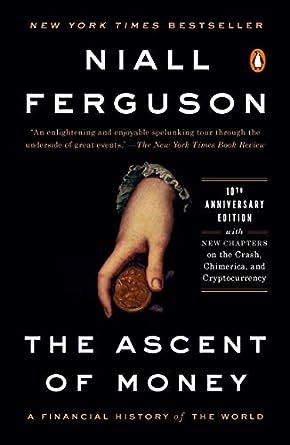More on this book
Community
Kindle Notes & Highlights
Read between
August 20 - August 26, 2018
Money, it is conventional to argue, is a medium of exchange, which has the advantage of eliminating inefficiencies of barter; a unit of account, which facilitates valuation and calculation; and a store of value, which allows economic transactions to be conducted over long periods as well as geographical distances. To perform all these functions optimally, money has to be available, affordable, durable, fungible, portable and reliable.
Money is worth only what someone else is willing to give you for it. An increase in its supply will not make a society richer, though it may enrich the government that monopolizes the production of money. Other things being equal, monetary expansion will merely make prices higher.
What the conquistadors failed to understand is that money is a matter of belief, even faith: belief in the person paying us; belief in the person issuing the money he uses or the institution that honours his cheques or transfers. Money is not metal. It is trust inscribed.
By lending amounts in excess of its metallic reserve, it may be said to have pioneered the practice of what would later be known as fractional reserve banking, exploiting the fact that money left on deposit could profitably be lent out to borrowers.
In the modern world, power would go to the bankers, not the bankrupts.
. Rich and poor alike, people in the United States appear to regard bankruptcy as an ‘unalienable right’ almost on a par with ‘life, liberty and the pursuit of happiness’. The theory is that American law exists to encourage entrepreneurship - to facilitate the creation of new businesses. And that means giving people a break when their plans go wrong, even for the second time, thereby allowing the natural-born risk-takers to learn through trial and error until they finally figure out how to make that million. After all, today’s bankrupt might well be tomorrow’s successful entrepreneur.
Poverty, by contrast, is seldom directly attributable to the antics of rapacious financiers. It often has more to do with the lack of financial institutions, with the absence of banks, not their presence.
They executed their commission so well that Wellington was soon writing to express his gratitude for the ‘ample . . . supplies of money’. As Herries put it: ‘Rothschild of this place has executed the various services entrusted to him in this line admirably well, and though a Jew [sic], we place a good deal of confidence in him.’
Inflation is a monetary phenomenon, as Milton Friedman said. But hyperinflation is always and everywhere a political phenomenon, in the sense that it cannot occur without a fundamental malfunction of a country’s political economy.
By a continuing process of inflation, governments can confiscate, secretly and unobserved, an important part of the wealth of their citizens. By this method, they not only confiscate, but they confiscate arbitrarily; and, while the process impoverishes many, it actually enriches some. The sight of this arbitrary rearrangement of riches strikes not only at security, but at confidence in the equity of the existing distribution of wealth.
Of all the lessons to have emerged from this collective effort, this remains the most important: that inept or inflexible monetary policy in the wake of a sharp decline in asset prices can turn a correction into a recession and a recession into a depression.
The question is, how do we deal with the risks and uncertainties of the future? Does the onus fall on the individual to insure against misfortune? Should we rely on the voluntary charity of our fellow human beings when things go horribly wrong? Or should we be able to count on the state - in other words on the compulsory contributions of our fellow taxpayers - to bail us out when the flood comes?
What had begun as a system of large-scale insurance had simply become a system of taxation, with today’s contributions being used to pay today’s benefits, rather than to accumulate a fund for future use.
that, far from being ‘a monster that must be put back in its place’, as the German president recently complained,31 financial markets are like the mirror of mankind, revealing every hour of every working day the way we value ourselves and the resources of the world around us.


